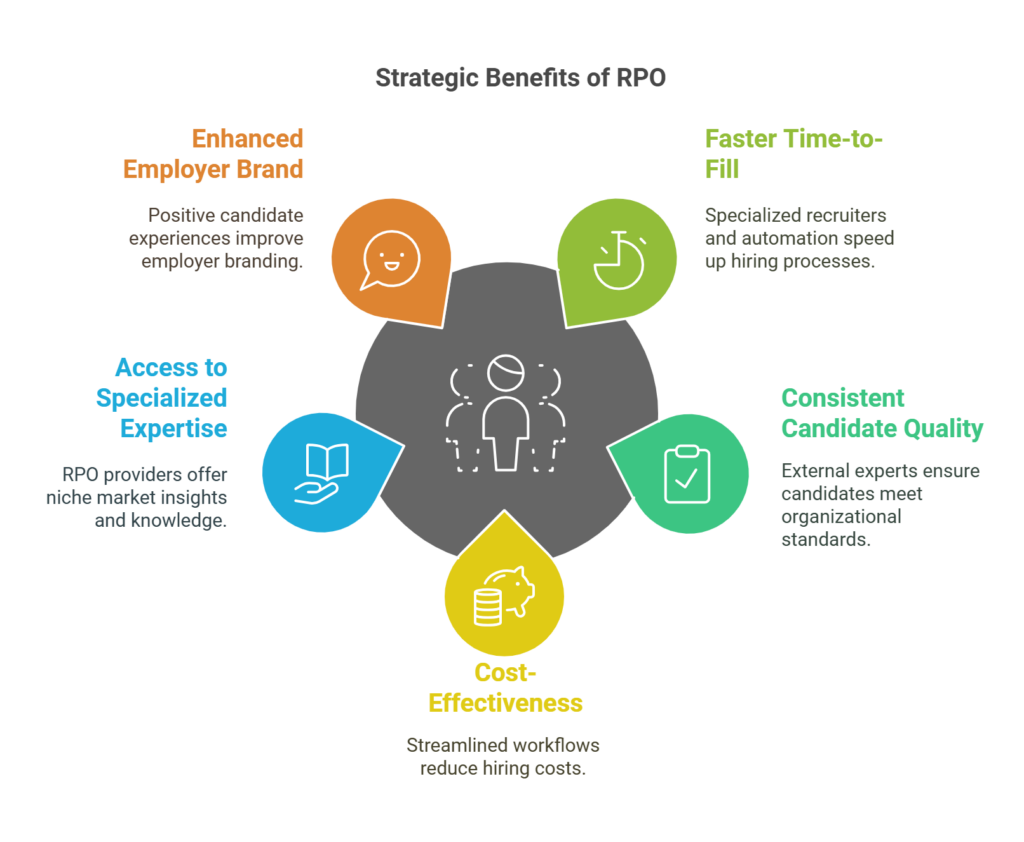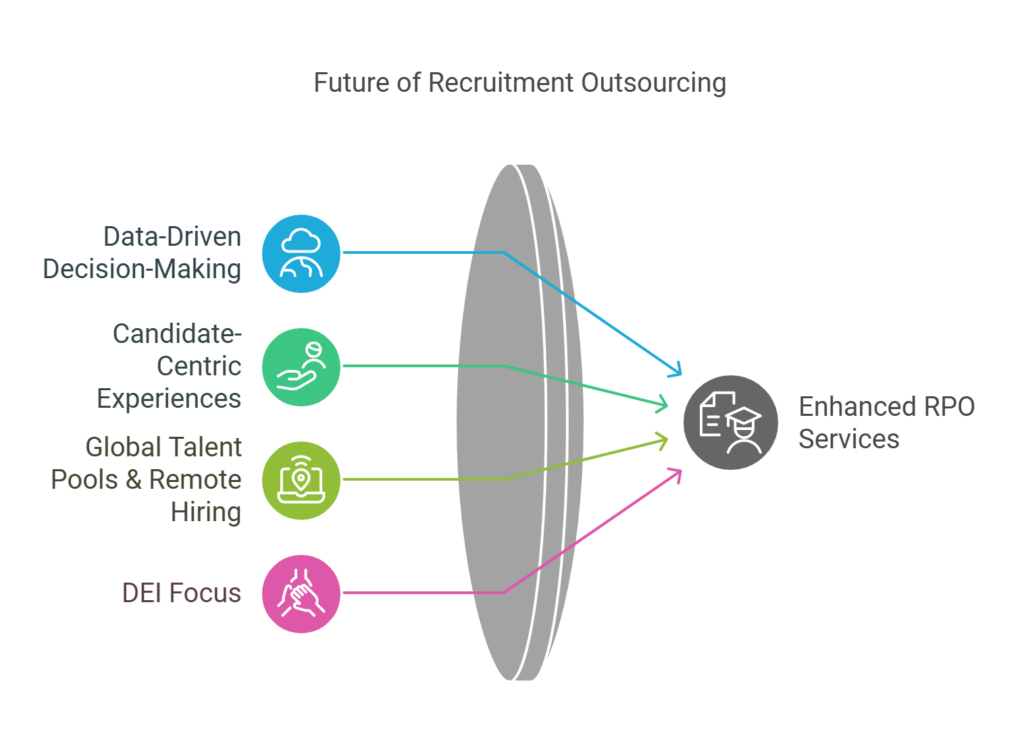Attracting and retaining the right talent is a critical component of long-term business success. Yet, as global labor markets evolve and skill shortages become more pronounced, many organizations struggle to efficiently identify, engage, and onboard high-quality candidates. Recruitment Process Outsourcing (RPO) emerges as a strategic solution that entrusts end-to-end hiring functions—or discrete segments of the recruitment cycle—to specialized external partners. This approach empowers companies to refine their talent acquisition strategies, shorten time-to-fill metrics, reduce cost-per-hire, and maintain consistently high candidate quality.
To contextualize RPO within the larger outsourcing ecosystem, revisit the principles laid out in our Outsourcing Knowledge Hub: Definitions, Categories, and Industry Landscape. By understanding how RPO complements broader outsourcing strategies, you can more effectively integrate it with other functions—such as Human Resources Outsourcing Services or leverage the foundational concepts found in What is a Business Process Outsourcing (BPO)? Understanding Its Core Role.
Defining Recruitment Process Outsourcing
Unlike traditional recruitment models—where HR teams often juggle multiple roles—RPO partners serve as dedicated talent acquisition experts. Their services can encompass the entire hiring journey or focus on specific aspects, such as sourcing, screening, assessment, interviewing, offer management, onboarding, and even employer branding initiatives. By integrating RPO capabilities, organizations tap into specialized skill sets, advanced technologies, and refined methodologies that can significantly enhance their talent pipelines.
Key components of RPO include:
Strategic Sourcing: RPO providers use data-driven approaches, extensive candidate networks, and sophisticated tools to identify top talent efficiently.
Screening & Assessment: Standardized criteria, technology-driven evaluations, and validated assessment methods ensure candidates meet role requirements and company cultural values.
Interview Coordination & Selection: External recruiters handle scheduling, candidate communication, and initial interviewing processes, freeing internal teams to focus on final decision-making.
Offer Management & Onboarding: Once the right candidate is identified, RPO partners streamline the offer process and onboarding journey, accelerating the time it takes to integrate new hires into the workforce.
The Strategic Value of RPO
Adopting RPO is about more than simply offloading administrative tasks. It can fundamentally reshape how organizations compete for talent:
Faster Time-to-Fill:
Specialized recruiters, automation tools, and well-honed sourcing techniques result in quicker candidate identification. A shorter hiring cycle reduces opportunity costs and prevents talent gaps that hamper productivity.Consistent Candidate Quality:
External experts maintain rigorous standards, leveraging best practices and continuous improvement methods. Their focus on delivering consistent candidate quality ensures alignment with organizational values, skill requirements, and cultural fit.Cost-Effectiveness:
RPO often reduces the cost-per-hire by streamlining workflows, eliminating inefficient processes, and leveraging economies of scale. Instead of managing multiple external agencies or incurring overhead for internal recruiters, you pay for scalable services aligned with demand.Access to Specialized Expertise:
RPO providers stay abreast of emerging recruitment trends, technologies, and candidate expectations. They bring niche market insights and deep domain knowledge that can differentiate your talent acquisition strategy.Enhanced Employer Brand:
Strategic RPO partners support employer branding efforts by ensuring positive candidate experiences. Improved communication, timely feedback, and professional interactions leave candidates with a favorable impression, even if they aren’t ultimately hired.
Implementing Recruitment Process Outsourcing
Like other outsourcing engagements, successful RPO depends on careful planning, clear expectations, and ongoing collaboration:
Needs Assessment & Scope Definition:
Begin by identifying which hiring processes need improvement. Are you seeking full-cycle recruitment support or targeting specific bottlenecks like candidate sourcing or onboarding? Defining the scope helps your RPO partner craft a customized approach.Provider Selection:
Evaluate potential RPO providers based on their industry experience, client testimonials, technological capabilities, and track record in roles similar to yours. Consider cultural alignment, communication styles, and their ability to integrate with existing HR technologies.Technology Integration:
Modern recruitment thrives on data analytics, applicant tracking systems, AI-driven matching tools, and social media sourcing platforms. Ensure that the RPO partner can seamlessly integrate these technologies for data-driven hiring decisions and transparent reporting.Service Level Agreements (SLAs) & Key Performance Indicators (KPIs):
Define clear metrics for success—such as time-to-fill, candidate satisfaction scores, or diversity metrics. Establishing SLAs and KPIs fosters accountability, sets performance expectations, and supports continuous improvement.Change Management & Communication:
Introduce RPO providers to your internal HR team, hiring managers, and leadership stakeholders. Clarify roles, responsibilities, and communication protocols. Regular check-ins, feedback loops, and performance reviews ensure alignment with evolving organizational goals.
Aligning RPO with Other Outsourced Functions
RPO rarely exists in a vacuum. Integrating it with other outsourced services can amplify benefits and streamline operations:
HR Outsourcing Complement:
Aligning RPO with HR Outsourcing ensures seamless transitions from hiring to onboarding, benefits administration, and performance management. This integrated approach can improve employee retention and overall workforce satisfaction.Financial & IT Outsourcing Synergies:
Timely, strategic hiring supports initiatives led by external financial advisors, outsourced CFOs, or IT specialists. By ensuring that new hires possess the required technical and analytical skills, RPO enhances the value gained from other outsourced partners.Adapting to Market Shifts:
In times of rapid expansion, market changes, or new product launches, RPO can quickly scale recruitment efforts. This flexibility helps organizations maintain agility and respond proactively to emerging talent demands.
Future Trends in Recruitment Process Outsourcing
As business landscapes evolve, RPO providers continuously adapt to stay competitive and deliver value:
Data-Driven Decision-Making:
With the integration of analytics and AI, RPO is becoming more predictive. Providers analyze historical performance, track candidate pipelines, and use data to forecast future hiring needs.Candidate-Centric Experiences:
As job seekers gain leverage in tight labor markets, RPO partners focus on creating engaging candidate experiences—expedited feedback loops, mobile-friendly application processes, and personalized communication.Global Talent Pools & Remote Hiring:
Increasingly, geographical boundaries no longer confine talent acquisition. RPO supports global or remote hiring strategies, ensuring that your business can tap into international markets or specialized skills across different regions.Diversity, Equity, and Inclusion (DEI) Focus:
As organizations prioritize DEI, RPO providers integrate inclusive sourcing strategies and unbiased screening tools. By expanding the candidate pool and minimizing bias, RPO supports diverse and dynamic workforces.
Maximizing RPO’s Impact
To harness the full potential of RPO, treat your provider as a strategic partner rather than a transactional vendor. Share insights into your corporate culture, long-term growth plans, and projected skill needs. By doing so, you enable them to tailor their approach, improving candidate fit and retention rates.
Continuous performance evaluations, open communication channels, and mutual feedback loops enhance results over time. As your organization’s needs change—whether due to market trends, technological advancements, or internal restructuring—an adaptable RPO partner can pivot strategies and maintain a steady influx of qualified candidates.
Conclusion: Transforming Talent Acquisition Through RPO
Recruitment Process Outsourcing empowers organizations to navigate competitive labor markets with efficiency, agility, and precision. By entrusting hiring functions to specialized external recruiters, you gain access to state-of-the-art tools, market intelligence, and best practices that streamline the entire talent acquisition process. Whether you’re a rapidly growing startup or an established enterprise seeking to refine your talent strategy, RPO offers a scalable, cost-effective pathway to building high-performing teams.

